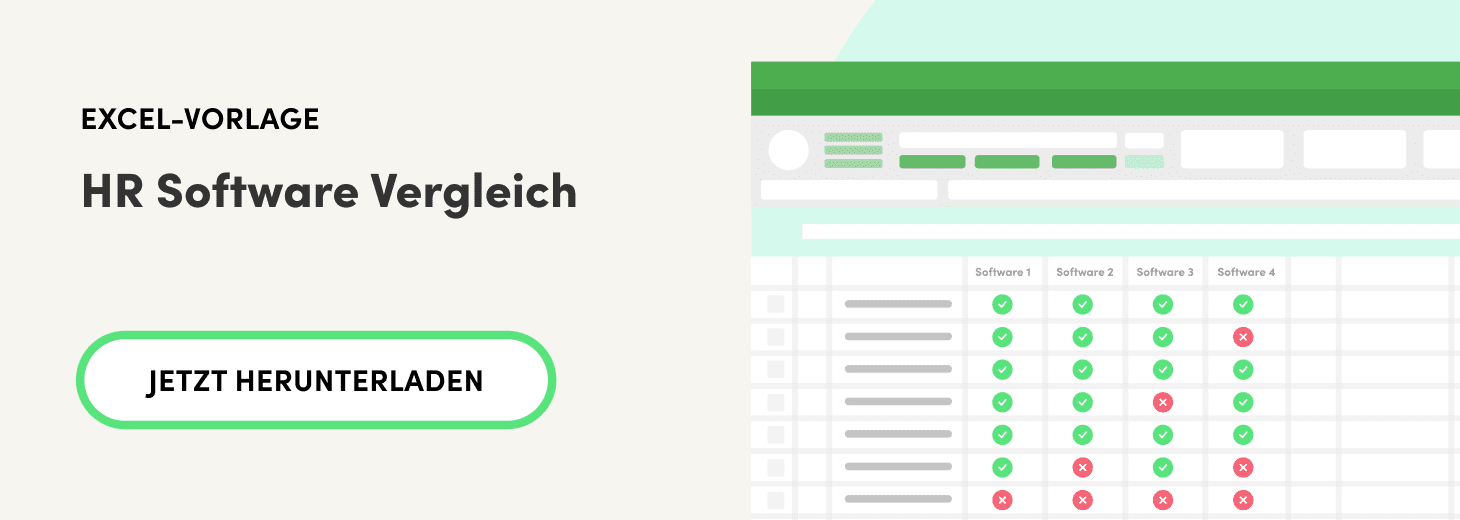Tired of HR Software providers letting you down?

We all know that situation: You rely on the product of your service provider in your daily work routine and then suddenly nothing works anymore. The application can no longer be opened, nobody can be reached by phone and your workflows are paralyzed. The result: Dissatisfied employees, incomplete work, and lost revenue.
The same applies to your HR software: interruptions in ongoing business can quickly result in financial losses and negative effects on your business. Do these issues sound familiar? Then let us help you: Kenjo - The HR software that really works. In this article we will explain why it is crucial to choose the right HR software, what negative experiences our customers have had with other software providers and why Kenjo is different!
The importance of software providers
The importance of software vendors in the context of a business venture is not to be underestimated. Optimized processes and streamlined workflows should save your company money and time. On the other hand, if your system is outdated and overcomplicated, there will be huge losses - so it's time for you to think about a new HR software.
At Kenjo, we see ourselves as the central hub of your business with our HR software: This is where all important data and loose ends come together and promote communication and the success of your company. Let our all-in-one HR solution convince you too.
The benefits of an HR Software for your employees
An HR software offers a variety of benefits for employees in a company. Here are some of the most important:
- Access and Transparency: One of the points that make an HR software so important for your employees is the high level of transparency that such an application offers. Your employees always have access to the most important data from anywhere, allowing them to stay up to date with and in the loop with any and all relevant developments. This increases company transparency and participation of each individual.
- Participation: An HR software enables employees to update and view their personal data such as address, bank details and emergency contacts. This frees up HR resources, by allowing the individual to update their personnel file with any relevant changes.
- Time off and absence management: An HR application can enable employees to request vacation days, report sick days and view their remaining vacation days. This reduces the administrative burden for the HR team and Managers by cutting down on unnecessary steps, and gives employees a better understanding of how many vacation days they have left.
- Performance management: An HR software can provide a performance management system that gives employees a way to track their goals and performance, get feedback from their managers, and plan their career development. Try Kenjos performance management today.
- Training management: An HR software can help employees find and book training and development opportunities to improve their skills and advance their careers.
- Communication: An advanced HR software should serve as a central means of communication between HR managers and employees. It can provide a platform to share information such as company policies, compensation information, and other important updates.
Overall, an HR software can help reduce the workload of the HR department by offering employees self-service capabilities and automating processes for HR departments. For employees, this means easier management of their personal information and work processes, which can lead to greater job satisfaction and improved employee engagement and stronger loyalty to the employer.
The consequences of using inadequate HR Software
As previously mentioned, interruptions in the work processes can lead to significant time and monetary losses. This means your HR software needs to be up and running as well. If this is not guaranteed, the success of your entire company is at risk, as problems with recruiting, onboarding or payroll accounting can lead to interruptions in critical processes.
The most common signs that your current HR Software isn't right for you
- Problems with the quality and age of the software
- Most companies that we work with, introduced their first HR software solutions 10 to 20 years ago. No updates have been carried out since then and legacy knowledge has been lost. Even in HR departments themselves, employees often do not know what it takes to survive in the modern HR world, as the internal HR solutions are old and technically outdated. Technologically outdated software solutions are often seen (and are) a barrier for younger employees, decreasing job satisfaction and employee retention.
- Expensive software and inadequate customer support
- Another negative experience many customers often experience, are the exorbitant pricing structures. Long, obligatory contracts bind customers to the provider, often with a bloated feature set that is either not relevant or technically outdated. On top of that, many software providers lack adequate and responsive customer support, stranding customers in times of need. Kenjo is different: Look at our pricing model now!
- Delays in delivery or implementation
- There are several reasons why there may be delays in the delivery or implementation of a software by a third party. The provider may encounter technical difficulties that delay the implementation of the software. For example, there may be compatibility issues between the new software and existing hardware or other software already in use.
The third party may have trouble deploying the software on time because the development is more complex than expected or because there are difficulties in collaborating between different teams or departments, or simply because of a lack of internal resources. Furthermore, it is often not guaranteed that the application will work remotely, i.e. from the home office, which can lead to further problems. This is different with Kenjo - our technical support is available 24/7 and is always at hand to resolve any potential issues.
- There are several reasons why there may be delays in the delivery or implementation of a software by a third party. The provider may encounter technical difficulties that delay the implementation of the software. For example, there may be compatibility issues between the new software and existing hardware or other software already in use.
- Outdated systems - Opaque contract terms
- Often the person who introduced the now outdated system has not worked in the company for a long time and at the same time, handovers and documentation has been lost. In addition, the HR software is usually hoster on their own servers, which causes additional high costs. Cloud solutions like Kenjo can help here. We not only offer competitive pricing but also prioritize a rigorous approach to safeguarding your data. Due to the traditionally high cost of implementing outdated systems, our affordable yet advanced solution often comes as a pleasant surprise to new customers. We can also quickly dispel any doubts in a demo of our HR software.
How to avoid poor performing Software in the future
- The most important advice first: The HR department should determine which HR software to purchase and not the IT-department or any other department. While other departments may be stakeholders in the software selection process, it is only the HR department that truly knows the challenges and tasks that need to be solved. Through regular communication with the software provider, you should then make it clear that they deliver what they promise and can also guarantee the best prices on the market. With clear contractual terms, you can ensure from the outset that both sides are clear about their rights and obligations and thus no disappointed expectations arise.
To control the quality of the delivered software, you should set up an internal team consisting of experts from different directions. For example, an HR Manager, IT Manager, and Sales Manager could work together to put the HR software through its paces.
How to prevent bad experiences with your HR software provider in the future
- Acquisition of HR software: summary of the most important points
- Before you think about purchasing an HR software, you as an HR manager should clarify what is important for your department and why you want to introduce a new solution right now. Of course, these are often economic reasons, but growth can also play an important role here. In our experience, however, it is often the technology that no longer meets the requirements that leads to people thinking about purchasing a new HR software.
As soon as the decision has been made that a new software should be implemented and what the reasons for this are, one should consider who else in the company is involved in the project. Our recommendation for future buyers of software products is then to consider together what the optimal solution looks like for you and what the schedule for the implementation of HR software looks like.
The central question: Which criteria are particularly important for you in the decision-making process? And which people should be included in the ongoing decision-making process once the criteria for software have been defined?
We can help you work through these questions and clarify any other concerns that you might have together with our team of experts during a Demo. If you do need additional information, you are more than welcome to read through our Guide to choosing an HR software.
- Before you think about purchasing an HR software, you as an HR manager should clarify what is important for your department and why you want to introduce a new solution right now. Of course, these are often economic reasons, but growth can also play an important role here. In our experience, however, it is often the technology that no longer meets the requirements that leads to people thinking about purchasing a new HR software.
How to choose the right HR Software for your company
First of all, choosing the right software provider is about your own personal selection criteria. Of course, ratings and references from other customers play an important role and the terms of the contract must also be tailored to you and your company's needs, but ultimately the provider must fit the situation of your company.

At Kenjo, we have tailored our application primarily for companies with frontline workers in service and production, with or without an office workstation. Our HR software is optimized for small and medium-sized businesses (SMEs) looking for an all-in-one HR solution. We would be happy to guide you through a personal demo and show you why Kenjo is the best software to meet your HR needs.
To support you further in choosing the right HR software we created an HR-guide to explain the different options available on the market and the steps you need to take. Our article “How to choose HR software that’s right for your business” also helps in decision making. With our HR Software Comparison Excel template you can compare the different Human Resources software on the market with our Excel template.
